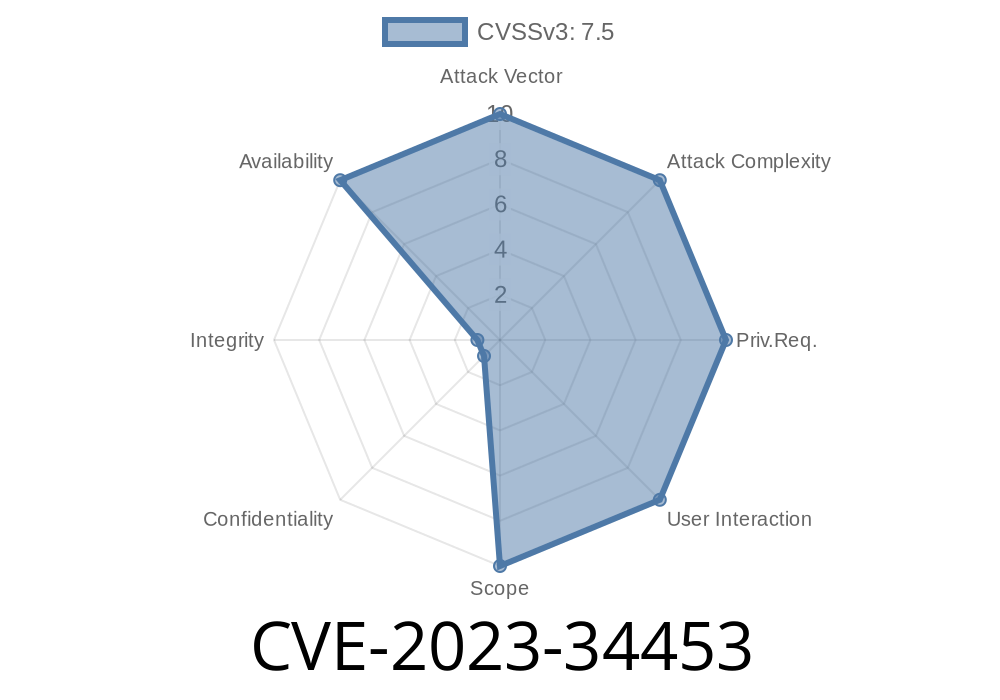Overview:
snappy-java is a popular Java library known for its high-speed compression and decompression. A serious flaw existed before version 1.1.10.1, tracked as CVE-2023-34453, where improper integer multiplication in the shuffle function could cause a fatal application crash. This post breaks down the vulnerability, the affected code, exploitation impact, and the fix—in plain language.
What’s the Snappy-java Vulnerability?
The risk comes from unchecked arithmetic in the method shuffle(int[] input) inside BitShuffle.java. This function multiplies the input array's length by 4 (since an int in Java is 4 bytes) before sending it to a native shuffle function. If someone passes a very large array, the multiplication can "wrap around"—an integer overflow—ending up with an incorrect, negative, or even zero value!
Here’s a simplified code snippet from vulnerable versions
public static void shuffle(int[] input) {
int byteLength = input.length * 4; // Potential overflow here!
byte[] out = new byte[byteLength];
shuffleNative(input, out, byteLength); // Sends the wrong size to native code
}
If input.length is too large, byteLength turns negative or much smaller than it should be.
Negative size:
Java throws NegativeArraySizeException when trying to create arrays with negative size, immediately crashing your app.
Too small or zero size:
Appears to work, but later code will try to access outside of bounds (ArrayIndexOutOfBoundsException), or worse, supply misleading lengths to native code—sometimes risking memory corruption if those bounds aren’t checked.
Exploiting the Vulnerability
If an attacker, or a bug elsewhere in the program, provides a very large input array, the multiplication silently fails:
| Example | input.length | byteLength Calculation | Result |
|-------------------------------------|------------------------|-------------------------|-----------------|
| Normal (safe) | 10 | 10 * 4 = 40 | OK |
| Trigger integer overflow (bad) | 600_000_000 | 600,000,000 * 4 = -1694967296 | Negative size |
| Zero (edge case) | | * 4 = | Out-of-Bounds |
| Large, but not overflow | 500_000_000 | 2_000_000_000 | Might work, but risky if close to limit |
How would an exploit work?
Crash target system by sending a massive array to shuffle(), causing a negative allocation.
- If an application blindly accepts user input for compression or decompression (like file uploads, RPC data), attackers can reliably crash the JVM. In native-linked systems, this could theoretically lead to more severe memory corruption, although snappy-java primarily exposes this as a Java exception.
Other Affected Types
There are similar functions for double, float, long, and short, each multiplying the length by different values (their byte-size), all affected by the lack of an upper-bound check.
FIX: How Was This Patched?
Version 1.1.10.1 of snappy-java introduced this patch:
- Explicit Integer Bound Check: Before allocating or passing arrays, code checks for overflow and throws a clear error if input is too large.
shuffleNative(input, out, (int) byteLength);
}
`
This prevents integer overflow and ensures only safe array sizes are accepted.
---
## References
- CVE-2023-34453 Security Advisory
- snappy-java Release v1.1.10.1
- Original Patch Commit
---
## What Should You Do?
- Update snappy-java to version >= 1.1.10.1.
- Audit code for large, possibly user-controlled arrays passed to compression/decompression.
- Never trust input size: Always validate before processing.
---
## Conclusion
CVE-2023-34453 is a classic example of how unchecked arithmetic can lead to real-world reliability bugs and potential exploits—even in "safe" languages like Java. The fix is simple: check your math before using it for memory operations.
Stay safe. Patch early!
---
Feel free to share or cite this post. If you need simple advice about Java security issues, just ask!
Timeline
Published on: 06/15/2023 17:15:00 UTC
Last modified on: 06/27/2023 15:59:00 UTC
